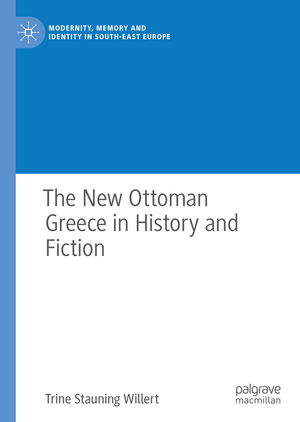The New Ottoman Greece in History and Fiction: Modernity, Memory and Identity in South-East Europe
Autor Trine Stauning Willerten Limba Engleză Hardback – 14 sep 2018
| Toate formatele și edițiile | Preț | Express |
|---|---|---|
| Paperback (1) | 466.45 lei 6-8 săpt. | |
| Springer International Publishing – 31 ian 2019 | 466.45 lei 6-8 săpt. | |
| Hardback (1) | 471.69 lei 6-8 săpt. | |
| Springer International Publishing – 14 sep 2018 | 471.69 lei 6-8 săpt. |
Din seria Modernity, Memory and Identity in South-East Europe
- 17%
 Preț: 523.81 lei
Preț: 523.81 lei - 15%
 Preț: 702.05 lei
Preț: 702.05 lei - 15%
 Preț: 502.54 lei
Preț: 502.54 lei - 15%
 Preț: 584.26 lei
Preț: 584.26 lei -
 Preț: 380.84 lei
Preț: 380.84 lei - 18%
 Preț: 780.37 lei
Preț: 780.37 lei - 18%
 Preț: 786.36 lei
Preț: 786.36 lei -
 Preț: 386.81 lei
Preț: 386.81 lei - 15%
 Preț: 499.59 lei
Preț: 499.59 lei - 18%
 Preț: 892.11 lei
Preț: 892.11 lei - 15%
 Preț: 581.14 lei
Preț: 581.14 lei - 18%
 Preț: 887.68 lei
Preț: 887.68 lei - 18%
 Preț: 780.82 lei
Preț: 780.82 lei - 15%
 Preț: 643.16 lei
Preț: 643.16 lei - 15%
 Preț: 698.80 lei
Preț: 698.80 lei
Preț: 471.69 lei
Preț vechi: 554.93 lei
-15% Nou
Puncte Express: 708
Preț estimativ în valută:
90.26€ • 94.43$ • 74.98£
90.26€ • 94.43$ • 74.98£
Carte tipărită la comandă
Livrare economică 02-16 aprilie
Preluare comenzi: 021 569.72.76
Specificații
ISBN-13: 9783319938486
ISBN-10: 3319938487
Pagini: 241
Ilustrații: XIII, 225 p. 1 illus.
Dimensiuni: 148 x 210 x 24 mm
Greutate: 0.44 kg
Ediția:1st ed. 2019
Editura: Springer International Publishing
Colecția Palgrave Macmillan
Seria Modernity, Memory and Identity in South-East Europe
Locul publicării:Cham, Switzerland
ISBN-10: 3319938487
Pagini: 241
Ilustrații: XIII, 225 p. 1 illus.
Dimensiuni: 148 x 210 x 24 mm
Greutate: 0.44 kg
Ediția:1st ed. 2019
Editura: Springer International Publishing
Colecția Palgrave Macmillan
Seria Modernity, Memory and Identity in South-East Europe
Locul publicării:Cham, Switzerland
Cuprins
1. Introduction – The New Ottoman Greece: A Heritage in Search of Identity and Inheritors.- 2. New Approaches to the Ottoman Legacy in Historiography, Education, and Music Studies.- 3. Fearing Neo-Ottomanism: Counter-discourses and Reactions to the ‘New Ottoman Greece’.- 4. Cultivating Osmanalgia: Intersections of History and Fiction in Thessaloniki.- 5. Narrating the Nation and its (Ottoman) Legacy: The Greek Historical Novel and the Role of Fiction Writers.- 6. Appropriating the Ottoman Past in Three Novels: Greek-Turkish Friendship, Nostalgia and Religious Co-existence.- 7. Epilogue – Ottoman Greece from 1980 to 2018.
Notă biografică
Trine Stauning Willert is an Honorary Research Fellow at the University of Birmingham’s Centre for Byzantine, Ottoman and Modern Greek Studies, UK. Previously she was Assistant Professor in Modern Greek Studies at the University of Copenhagen where she was a member of the research centre ‘The Many Roads in Modernity: South-East Europe and its Ottoman Roots’.
Textul de pe ultima copertă
This book explores the increasing interest in the Ottoman past in contemporary Greek society and its cultural sphere. It considers how the changing geo-political balances in South-East Europe since 1989 have offered Greek society an occasion to re-examine the transition from cultural diversity in the imperial context, to efforts to homogenize culture in the subsequent national contexts. This study shows how contemporary immigration and better relations with Turkey led to new directions in historiography, fiction and popular culture in the beginning of the twenty-first century. It focuses on how narratives about cultural co-existence under Ottoman rule are used as a prism of national self-awareness and argues that the interpretations of Greece’s Ottoman legacy are part of the cultural battles over national identity and belonging. The book examines these narratives within the context of tension between East and West and, not least, Greece’s place in Europe.
Caracteristici
Explores historical and literary narratives of the Ottoman past in contemporary Greek society and culture Places the development of new Greek national identities within an international context, taking account of changing geopolitical power balances in Europe and Turkey’s changing roles since 2000 Takes an interdisciplinary approach to heritage, literary and cultural studies, in order to offer new insights into how the Ottoman past continues to shape national identities
